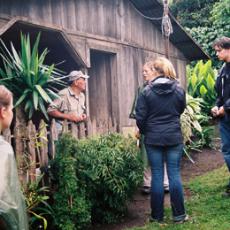This is the VOA Special English Agriculture Report.
The University of Georgia is a respected research university. Thirty-five thousand students attend the main campus in Athens, Georgia, and extended campuses around the state. And among its areas of research is agriculture.
UGA has a center in San Luis de Monteverde in Costa Rica. This center is for students and visitors who want to learn more about farming and living in environmentally friendly ways.
Some students take a class called "Coffee: From Bean to Cup." Coffee is one of the most widely traded products in the world, and the most important agricultural product for Costa Rica.

Professor Valerie Peters teaches the class. Her students help her study coffee farms in an area called Finca la Bella. Farmers in this area agreed to grow their coffee sustainably, using methods that do less harm to the environment.
Most coffee farms in Costa Rica have one or two different kinds of trees to help shade the coffee plants from the sun. In Finca la Bella most farms have at least 20 kinds of trees. Many of the farmers have also planted more flowers. When there are more flowers and more kinds of trees, more bees will come to pollinate the coffee plants. Coffee plants can pollinate themselves, but bees help increase the harvest.
Professor Peters is working with her students to help teach farmers about the importance of bees and having more trees and flowers. "Many of the farmers commented that they never even thought of bees as having a role in their coffee production," she says.
Having more species of trees on coffee farms also provides more places for birds to live. If farmers have at least ten different kinds of trees per hectare, they may be able to have their coffee certified as "bird-friendly." This is done by the Smithsonian Migratory Bird Center in the United States. Bird-friendly coffee can sell for a higher price.
The University of Georgia is also helping farmers in Costa Rica increase their income through tourism. Professor Quint Newcomer directs this program. He says students help design tour routes through coffee farms.
QUINT NEWCOMER: "These farmers become our teachers. They are sharing their local knowledge about how to work the land in a really sustainable way, and they become the teachers. But then our students can also help provide them with ideas and recommendations about how to improve their tour. And the more they improve it, the more people want to go."
UGA Costa Rica, as the center is called, also plans to increase the amount of locally produced food it buys. The goal is to buy at least 50 percent locally by 2015.
And when the center needs wood for building, it buys only wood grown locally without artificial chemicals.
And that's the VOA Special English Agriculture Report. You can find more stories about coffee at voaspecialenglish.com, where you can also find texts and MP3s of our programs. I'm Karen Leggett.
Looking for answers to rising coffee prices
New attention given to child cocoa workers in Ivory Coast, Ghana
(来源:VOA 编辑:旭燕)
关注和订阅


电话:8610-84883645
传真:8610-84883500
Email: languagetips@chinadaily.com.cn